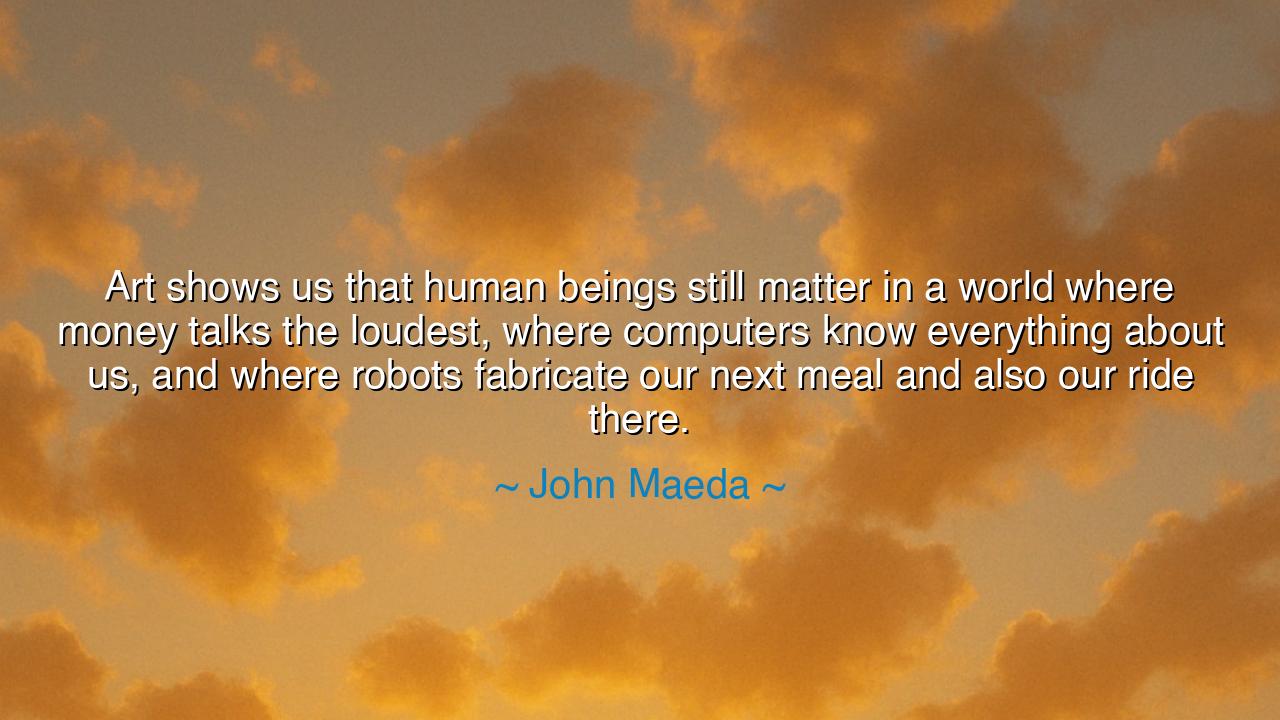
Art shows us that human beings still matter in a world where
Art shows us that human beings still matter in a world where money talks the loudest, where computers know everything about us, and where robots fabricate our next meal and also our ride there.






“Art shows us that human beings still matter in a world where money talks the loudest, where computers know everything about us, and where robots fabricate our next meal and also our ride there.” Thus spoke John Maeda, the artist, designer, and philosopher of the digital age, whose words ring like a sacred bell amidst the clamor of modern life. In this reflection, Maeda does not simply speak of art as beauty or decoration — he speaks of it as a testament to humanity, a flame that refuses to go out even as the world becomes colder, faster, and more mechanical. His words are both lament and celebration: a lament for a world that forgets the soul, and a celebration of the power of creativity to keep that soul alive.
In the ancient days, when the poets sang and the sculptors carved, art was not a luxury — it was a language of the spirit. The cavemen of Lascaux, painting animals upon the stone, were not seeking wealth or fame; they were reaching out across time, saying, “I was here. I saw. I felt.” From those earliest drawings to the cathedrals of Europe and the symphonies of Beethoven, art has always been the proof that man is more than a machine. It is the voice of feeling in an age of function, the breath of soul in a world of systems. Maeda, speaking as one who straddles the worlds of art and technology, reminds us that though we live among algorithms and artificial minds, it is creativity that still makes us human.
His quote emerges from a time when humanity stands at the crossroads of progress and peril. The computer, once our servant, now anticipates our every thought. The robot, once a marvel of invention, now feeds us, drives us, and soon may heal us. The marketplace, once a tool of exchange, now dictates worth not only of things, but of people. In such a world, Maeda declares, art becomes our last sanctuary — a space where value is not measured by currency or efficiency, but by meaning. It is the reminder that beyond the algorithms, there still beats the mysterious rhythm of the human heart.
Consider the story of Vincent van Gogh, who painted not for profit but for survival — to prove to himself that his existence had color even in despair. In his lifetime, he sold almost nothing; his work brought him no wealth, no fame. Yet, long after his death, his art speaks more powerfully than any machine, any fortune. Each stroke of his brush defies the silence of commerce; it proclaims that human emotion transcends time, data, and metal. Van Gogh’s sunflowers still bloom long after the factories that ignored him have turned to dust. His life stands as proof of Maeda’s words: that art endures where money fades, because it is rooted in what is eternal — the human soul.
Maeda’s reflection also carries a quiet warning. If art shows us that humans matter, what happens when art itself is forgotten, or replaced by machines that can mimic it? We already live in a time when artificial intelligence paints pictures, writes poetry, composes symphonies. Yet these creations, however flawless, lack the pulse of imperfection — the trembling emotion that comes from a real hand, a real heart. When Maeda speaks of “robots fabricating our next meal and our ride there,” he is not only describing convenience, but the risk of complacency — the danger that we will forget to wonder, to struggle, to feel. For it is in imperfection and emotion that our humanity lives.
But there is hope in his words. For even amidst this rising tide of automation, art remains unconquered. It is not something machines can truly possess, because it arises from consciousness — from the tension between joy and suffering, from the longing to be known. Art is the rebellion of the soul against the tyranny of logic. It whispers, “You are not your data. You are not your utility. You are alive.” Thus, in every painting, poem, song, or dance, we reclaim our humanity from the steel hands of progress.
So, dear listener of this age of circuits and screens, remember the teaching of John Maeda. Create. Reflect. Feel. Let your art — in whatever form it takes — be a declaration of your existence. When the world demands productivity, offer beauty. When machines speak in numbers, answer with stories. When life becomes automated, choose to be alive deliberately. Do not let the noise of commerce drown out the quiet melody of creation.
For one day, when the machines hum louder than the voices of men, it will be art — the work of human hands, human hearts, and human imagination — that reminds the world what it means to be human. Let Maeda’s words be your compass: in the kingdom of technology, art is the last sanctuary of the soul. Guard it, nurture it, and through it, keep the sacred truth alive — that no matter how loud the machines speak, the heart still whispers louder.






AAdministratorAdministrator
Welcome, honored guests. Please leave a comment, we will respond soon